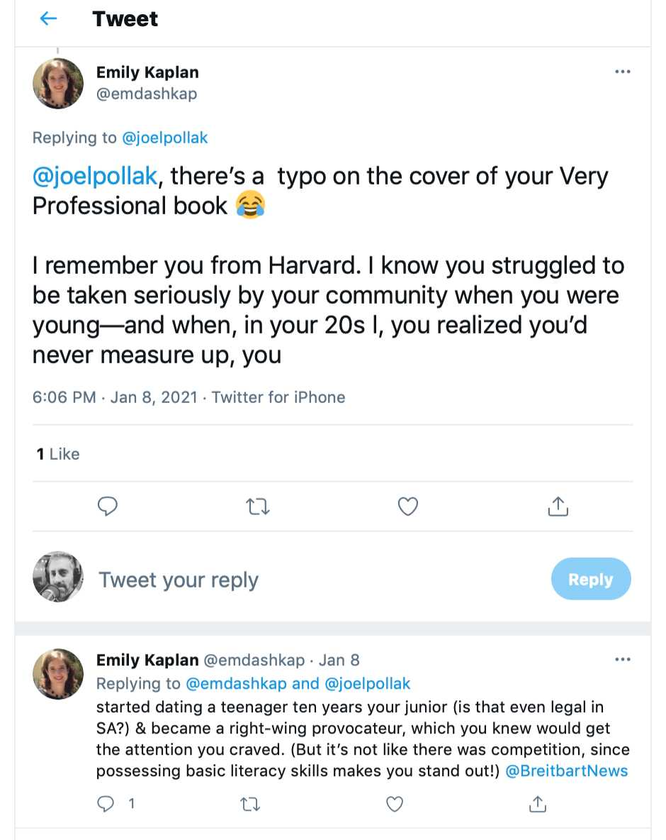This morning, while looking for a link to my book about South Africa (https://amazon.com/dp/B08SCK2S16) to send to a friend, I noticed an old tweet from a person who describes herself as a writer for the New York Times and the Washington Post. In it, she (correctly) identified a typo on my book cover (oops!), but then launched a bizarre personal attack on me and my wife. (Ironically, her attack also included a typo.)
She wrote: "I remember you from Harvard [I have no idea who she is -- Harvard College? Harvard Law?]. I know you struggled to be taken seriously by your community when you were young [I have no idea what that means]—and when, in your 20s l, you realized you’d never measure up [LOL], you started dating a teenager ten years your junior (is that even legal in SA?) [my wife was 18 and I was 27 when we started dating] & became a right-wing provocateur [I'm the guy who wants to debate, not "provoke"], which you knew would get the attention you craved [sure, that's why I became a conservative, LOL]. (But it’s not like there was competition, since possessing basic literacy skills makes you stand out! [among whom? Conservatives?])"
This is the sort of low-grade personal abuse to which conservatives are subjected all the time. My wife and I are enjoying our 12th year of marriage and we are expecting our 3rd child next month. Yes, we started dating when she was 18. We dated for almost five years before getting married. So what?
This is what they do when they can't argue the issues. Rather mundane, which is why I didn't notice it at the time. But it's not the first time I've run into it -- including at Harvard. The moment you "come out" as a conservative, you're a target.
It's demoralizing at first, but ultimately liberating, because once you lose your fear of being attacked by these people, you can think and say what you like.

This week’s portion launches the great story of Abraham, who is told to leave everything of his life behind — except his immediate family — and to leave for “the Land that I shall show you.”
There’s something interesting in the fact that Abraham is told to leave his father’s house, as if breaking away from his father’s life — but his father, in fact, began the journey, moving from Ur to Haran (in last week’s portion). His father set a positive example — why should Abraham leave him?
Some obvious answers suggest themselves — adulthood, needing to make one’s own choices, his father not going far enough, etc.
But I think there is another answer. Abraham (known for the moment as Abram) needs to establish his own household. This is not just about making one’s own choice, but really about choosing one’s own starting point. It’s starting over.
Sometimes we start over in fundamental ways even if much that surrounds us remains the same. Sometimes the journey we have to ...
The story of Noah is familiar; the details, less so.
Noah is often seen as an ambivalent figure. He was righteous -- but only for his generation. What was his deficiency?
One answer suggests itself: knowing that the world was about to be flooded, he built an Ark for the animals and for his own family -- but did not try to save anyone else or to convince them to repent and change their ways (the prophet Jonah, later, would share that reluctance).
Abraham, later, would set himself apart by arguing with God -- with the Lord Himself! -- against the destruction of Sodom and Gomorrah, saying that they should be saved if there were enough righteous people to be found (there were not).
Still, Noah was good enough -- and sometimes, that really is sufficient to save the world. We don't need heroes every time -- just ordinary decency.
Hi all -- as I noted last month, I'm going to be closing down my Locals page, at least for tips and subscriptions -- I may keep the page up and the posts as well, but I'm no longer going to be accepting any kind of payment.
Look for cancelation in the very near future. Thank you for your support!












